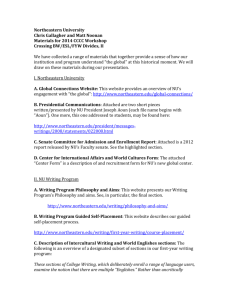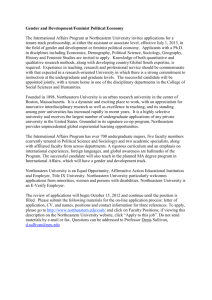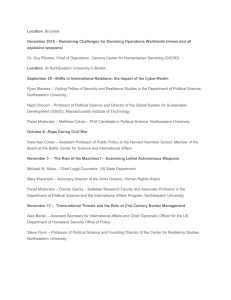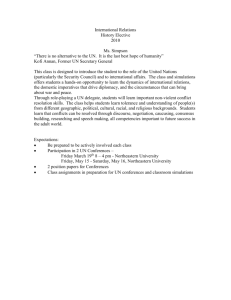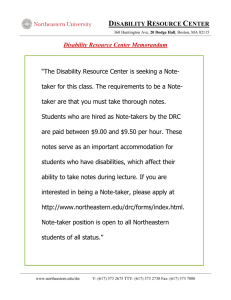Fair Use in Our University Today
advertisement
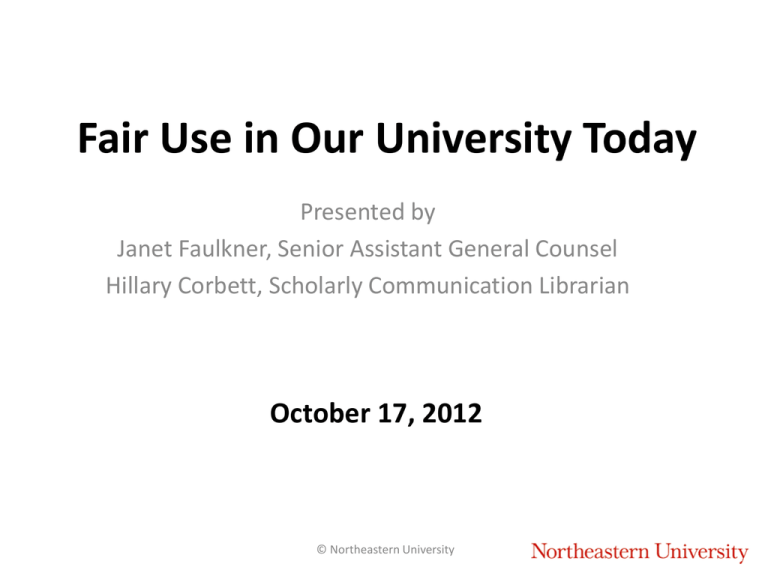
Fair Use in Our University Today Presented by Janet Faulkner, Senior Assistant General Counsel Hillary Corbett, Scholarly Communication Librarian October 17, 2012 © Northeastern University Overview of Session • Using copyright-protected works in the classroom and at the university • Fair use – What is it? – The four factors – Potential applications • Online education and hybrid courses – The TEACH ACT • Common questions about copyright and fair use • Q&A © Northeastern University Using Copyrighted Works in the Classroom and at the University • When will fair use apply? • When do I need to seek permission? • Legal alternatives for including creative material in your projects © Northeastern University What is Fair Use? You normally must obtain permission from the copyright owner to lawfully engage in any of these activities: • Produce copies of a work (or a portion thereof) • Prepare derivative works based on an original work • Distribute copies of a work (or a portion) • Perform a work (or a portion) in public • Display a work (or a portion) in public © Northeastern University Fair Use: The Four Factors Each use of a work should be preceded by a consideration of these four factors: 1. The purpose and character of the use, including whether it is educational or commercial 2. The nature of the copyrighted work 3. The amount and substance of the portion used 4. The effect of the use on the potential market for or value of the work © Northeastern University Fair Use: The Four Factors Transformativeness – the “fifth factor”? The key question in determining fair use is often whether the use is transformative: does it add value to and repurpose the work for a new audience? © Northeastern University Fair Use: The Four Factors Image courtesy of University of Minnesota Libraries © Northeastern University Potential Applications of Fair Use • In a face-to-face classroom • In an online learning environment • Selecting and using supplemental materials for a course • In creating materials for NU • For student activities © Northeastern University Online Education and Hybrid Courses • Incorporating copyrighted works (or portions thereof) into courses under development Always better to post links where possible in online environment • When is the TEACH Act applicable? (and when does it not apply?) • Copyrighted works and Blackboard © Northeastern University The TEACH Act • TEACH = Technology, Education and Copyright Harmonization • Only applies if there is no face-to-face component of the course • Generally speaking, defines the ability to use and include works in course content which digitally is available for online-only students • But there are stringent guidelines… © Northeastern University TEACH Act Guidelines 1. Use must be made as part of “systematic mediated instructional activities” (e.g., an online course offered by a university, with a dedicated instructor) 2. Use must be related directly to the learning objectives of the course 3. Works to be used must have been obtained lawfully 4. Works to be used must not have been created for use specifically in an online learning environment (examples: electronic supplements to printed textbooks, online course modules, etc.) 5. Access must be limited to students enrolled in the course (i.e. through password-protected learning environment) 6. Materials must be removed from view and access after the course has ended © Northeastern University Commonly Encountered Questions About Copyright and Fair Use • What are my options for providing course reserves vs. coursepacks for purchase? • How can I use material from electronic journals or databases in my teaching? • I want to give my students a copy of an article I wrote • I want my students to watch a movie outside of class that the library doesn’t own • I want my students to read an article/book chapter that the library doesn’t own © Northeastern University Commonly Encountered Questions About Copyright and Fair Use, cont’d. • I want to show a movie in my class • What is “the class”? How it is defined may make a difference • Library-owned vs. rented from Netflix vs. streamed from Internet • I want my students to make a video as a class project • What general guidance should I give my students? • We would like to show a movie as part of an NU campus activity © Northeastern University Copyright and Fair Use in the News How do recent legal decisions affect NU? – GSU E-reserves – UCLA streaming media © Northeastern University How Can the Library Help? • Online guides – Get Help > Copyright & Fair Use (FAQs, 4 factors continuum, and more!) – Find > Subject Guides > Open Access Resources – Find > Subject Guides > Multimedia Resources for Research and Content Creation • Assistance with course reserves – Services > Course Reserves • Assistance with media creation – Services > Digital Media Commons Studio © Northeastern University How Can the Office of General Counsel Help? • Provide guidance about faculty projects, and supervising student projects • Determine when releases are needed • Respond to online course development questions • Identify and address concerns about including sensitive information in projects © Northeastern University Questions? Janet Faulkner 617-373-2157 | j.faulkner@neu.edu Hillary Corbett 617-373-2352 | h.corbett@neu.edu © Northeastern University
